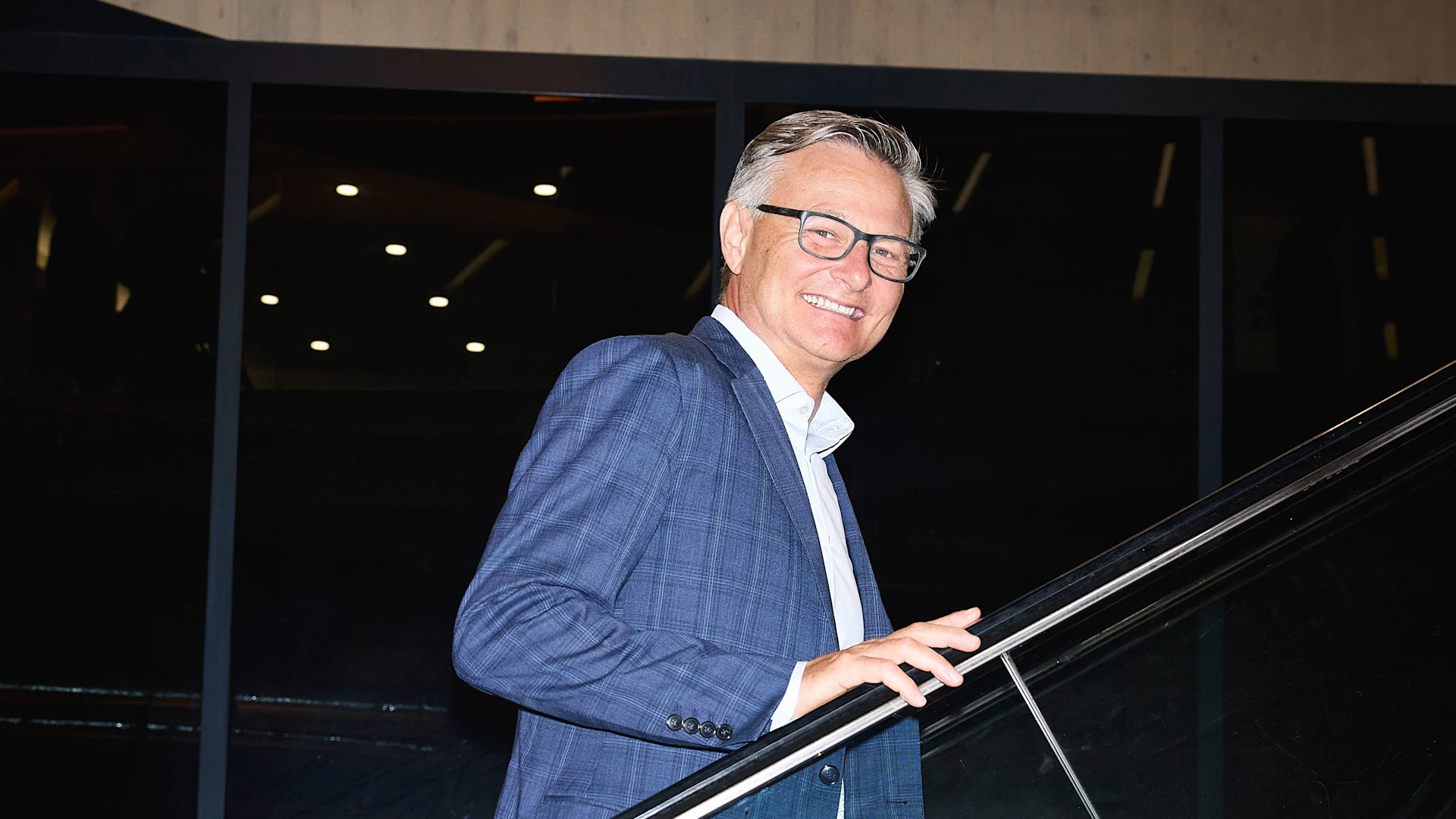
Interview
A Switzerland with high quality of life for everyone
In our interview, Mario Irminger outlines the Migros Group’s ambitions for its second century.
navigation

Migros anniversary
Comedians Nathalie Devantay, Charles Nguela and Flavio Sala reveal what they find funny and what makes their audiences laugh. They point out that humour differs from one region to the next.
Who do you think is the funniest: the French-speaking, German-speaking or Italian-speaking Swiss?
Nathalie Devantay (ND): To understand humour, you must be familiar with the culture and background. That aside, the women of Vaud are the funniest in my view.
Charles Nguela (CN): I knew you would say that. We spoke French as well as English at home, and I love how the French-speaking Swiss can change the melody of their language depending on their mood. And hearing the Italian-speaking Swiss swear always makes me laugh. Speaking on behalf of all German speakers, we can't do that at all.
Flavio Sala (FS): When I was a child, we only had the three national TV channels and I was forced to watch TV in French and German. That's how I discovered Louis de Funès, who I absolutely adore.
Do you like to poke fun at other parts of the country?
ND: Of course we enjoy making fun of the German-speaking Swiss, especially their serious, arrogant side. That always makes people in French-speaking Switzerland laugh.
CN: In German-speaking Switzerland, we don't make many jokes about our French-speaking or Italian-speaking compatriots. When it comes to humour, it is always better to punch upwards than downwards – in other words, not directing humour against the smaller group.
ND: Yes, because minorities soon start to feel attacked and then unite against the comedian.
But there are clichés about the French-speaking and Italian-speaking Swiss in German-speaking Switzerland too, aren't there?
CN: Yes, we say that the French-speaking Swiss drink a lot of white wine and that the mafia rules in Ticino.
FS: Hey, there's no mafia here, but nepotism and cronyism is really widespread in politics.
Is there a common Swiss sense of humour would you say?
CN: No, there are too many cultural and linguistic differences. In Switzerland, you travel 20 minutes by train and you're practically in a different country when it comes to humour. The upside of this is that there is a very wide variety of humour.
ND: But we do have a typically Swiss format in Switzerland, namely the revue, which is a review of the year. In France, when I say I'm performing in a revue, people often think that I have to take my clothes off.
In France, when I say I'm performing in a revue, people often think that I have to take my clothes off.
CN: That's right. We have these revues in German-speaking Switzerland too. But they are less common.
FS: We don't have any revues in Ticino. Generally speaking, I think there are fewer opportunities to perform here. Making a living from comedy in this part of the country is quite tough.
Does that mean you have to live off grants and subsidies?
FS: Unfortunately, comedians receive little or no funding for their performances. They are considered too trivial and silly. There is funding for street art and circuses, but not for us.
ND: Many people still fail to see culture as a laughing matter ...
CN: Stand-up comedians are not paid enough in Switzerland to make a living from it. We still get up on that stage though – even in the washroom of a bar, next to the cleaning cupboard if need be. I've been quite fortunate: some of you may have seen the advert with the cow in which I appear. I don't do those for nothing.
Are there any issues you don't joke about?
ND: You have lots of leeway on stage. But I believe we must remain respectful. The aim is to make people laugh, not to insult them.
FS: Children and older people often attend my shows. So I look for a style of humour that everyone enjoys and doesn't offend anyone. I don't tell the same jokes on stage as I do in the evening with friends at the bar.
CN: There are some things I can't joke about, for example serious illness. I also avoid making jokes about religion, depending on the city in which I'm performing.
There are some things I can't joke about, for example serious illness.
Can you joke about religion in Ticino?
FS: Yes. Politicians are pricklier though – they don't like being lambasted. It is becoming harder and harder to produce genuine satire in Ticino.
ND: That's a shame. We do that really well in French-speaking Switzerland. But it's true that it's becoming increasingly difficult to make people laugh without treading on somebody's toes. I've also noticed that men tense up more when a woman tells a joke about men. When a similar gag comes from a male comedian, they find it funny or even bold, but never inappropriate.
CN: It's true that women come in for more criticism ...
Yet the number of female comedians is on the rise ...
ND: That's true – more and more women are entering our profession, and sexist jokes are becoming rarer. However, I think that women on stage have become more vulgar.
FS: I've noticed this in Italy too. Female comedians are becoming bold enough to tell cruder jokes, but they're not having much success with them.
It is becoming harder and harder to produce genuine satire in Ticino.
You didn't know each other before this interview and you hadn't seen each other's shows, but now you get on well. How about holding a joint show in three languages?
CN: It would be great if we could do that. But that would be very challenging for us and for the audience. Not only because of the languages, but also due to the type of humour and topics addressed.
ND: Sketches about Swiss politics at federal level might work, but anything below that would fall flat. Maybe it would work as a video with subtitles?
FS: The problem with translations is that they are often disappointing. When I watch a comedy in French, I prefer to listen to what the actors are saying rather than read the subtitles. The original is always much funnier than the translation.
Charles, you've already performed your show in French in French-speaking Switzerland. How did that go?
CN: That's right, I performed in Fribourg. I realised you need perfect command of the slang and local expressions to be really funny. As a member of the audience at a show in Montreux, I noticed that people like to stay for a while afterwards to have a chat and a drink before going out to eat. In German-speaking Switzerland, most people eat beforehand and then go straight home afterwards. I'd like to change that. The audience should stay for longer.
ND: You're quite right – the audience often stays longer in our part of the country. I enjoy mingling with the audience at the theatre bar after the show. It is always a great chance to socialise.
FS: Listening to you both speak makes me want to get to know you better and go to your shows, even if I won't understand everything.
ND: That's a good idea. We should all do that – and the audience too. We could compare our differences, which would be great fun.
Discover exciting stories about all aspects of Migros, our commitment and the people behind it. We also provide practical advice for everyday life.